Environmental Crime: Green Criminology & Vulture Trade in South Africa
VerifiedAdded on 2023/06/09
|8
|2079
|293
Case Study
AI Summary
This case study examines the illegal trade of vulture parts in South Africa, viewed through the lens of green criminology, highlighting the environmental crime and its devastating consequences. The trade, driven by the use of vulture parts in traditional medicines and rituals, has led to a drastic decline in vulture populations, threatening several species with extinction and disrupting the ecosystem. Vultures play a crucial role as scavengers, preventing the spread of diseases by neutralizing pathogens in carcasses. Their decline leads to the rise of other scavengers that cannot neutralize these pathogens, potentially increasing the spread of diseases like rabies and impacting biodiversity. The study emphasizes the need for stricter national laws, anti-poaching measures, surveillance of illegal markets, captive breeding programs, and public education to protect vultures and prevent further ecological damage. The ultimate goal is to avoid the catastrophic consequences observed in other regions, where vulture populations have collapsed, leading to increased health risks and ecological imbalances. This case underscores the importance of addressing wildlife crime as a critical component of environmental protection and public health.
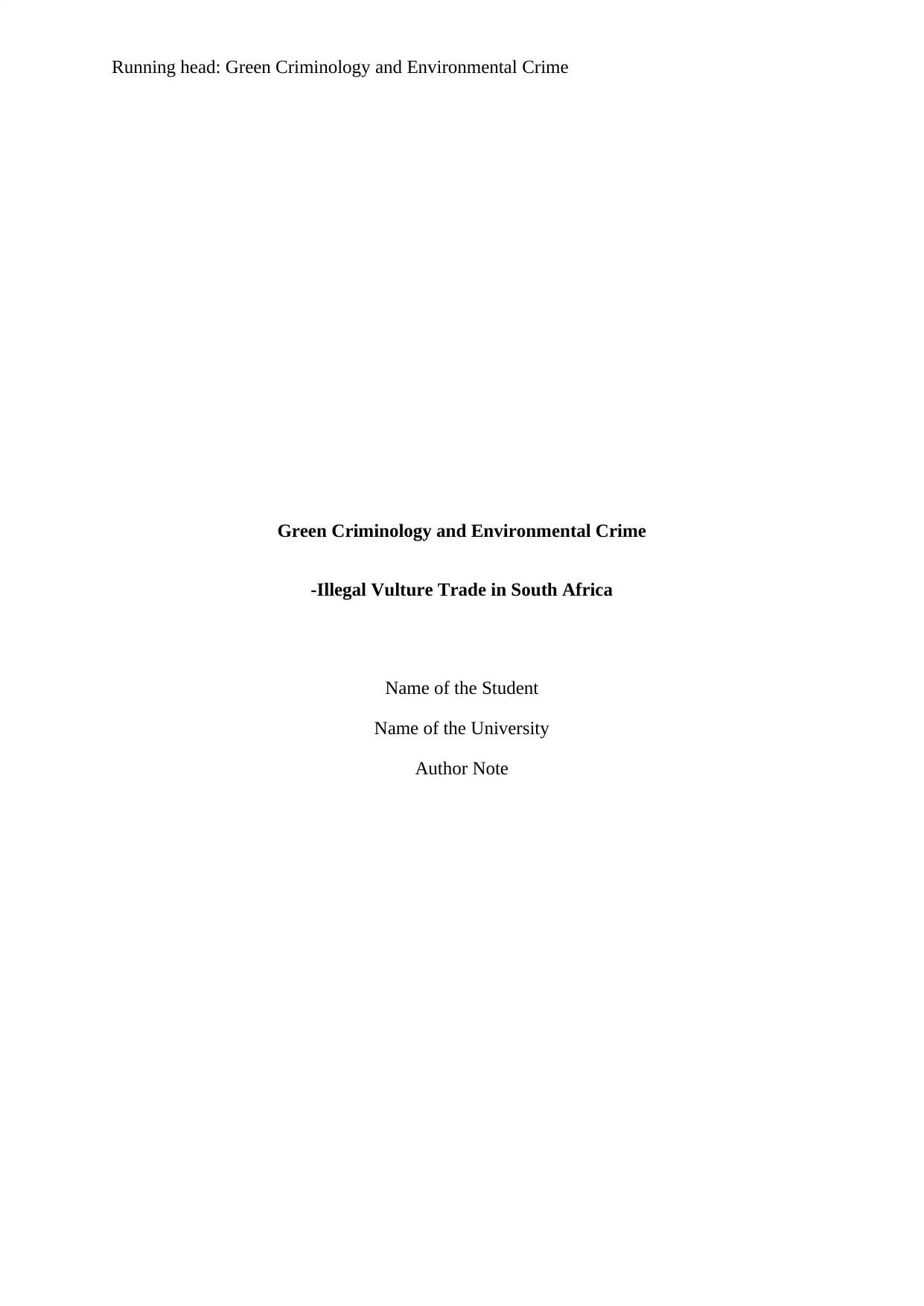
Running head: Green Criminology and Environmental Crime
Green Criminology and Environmental Crime
-Illegal Vulture Trade in South Africa
Name of the Student
Name of the University
Author Note
Green Criminology and Environmental Crime
-Illegal Vulture Trade in South Africa
Name of the Student
Name of the University
Author Note
Paraphrase This Document
Need a fresh take? Get an instant paraphrase of this document with our AI Paraphraser
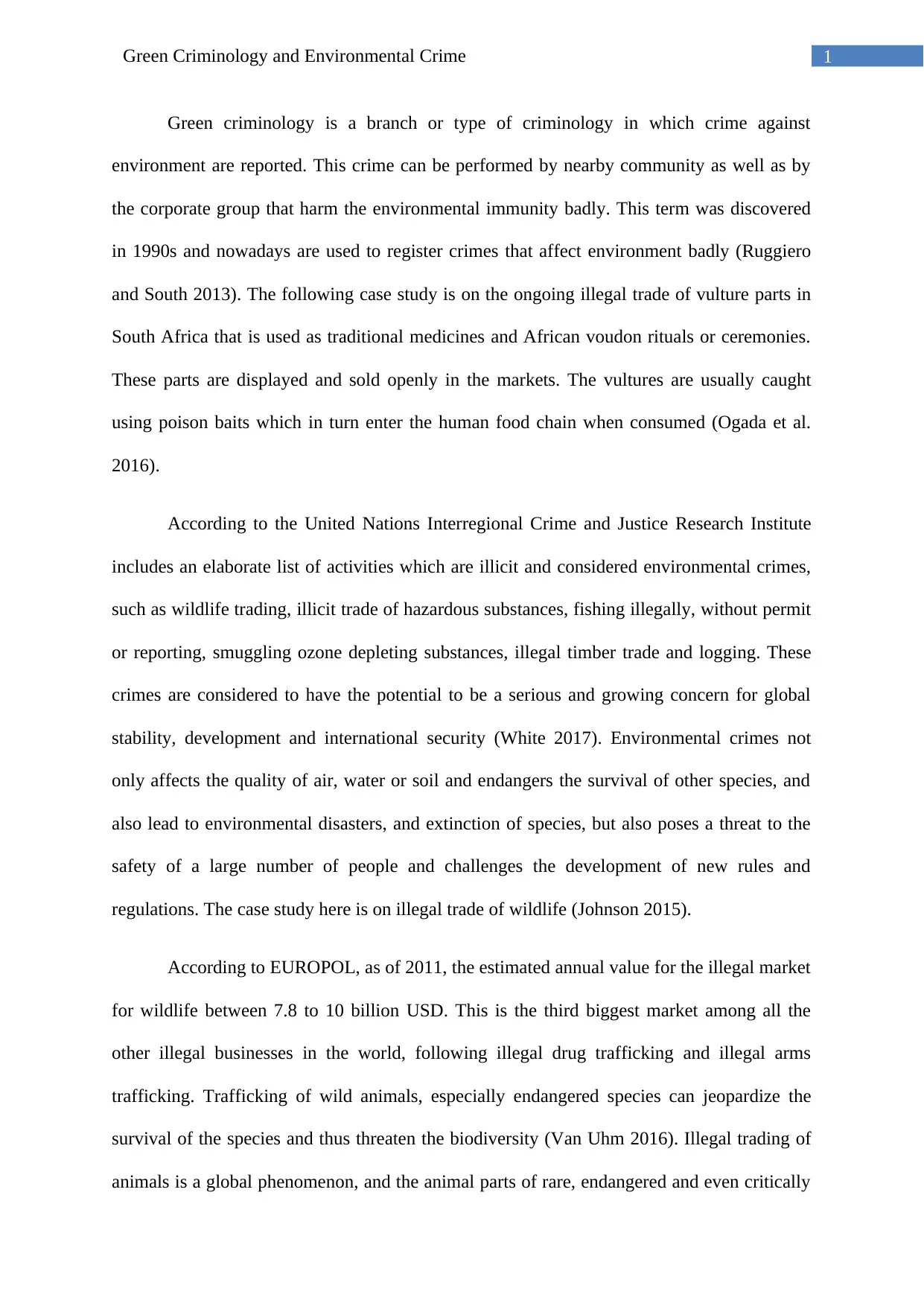
1Green Criminology and Environmental Crime
Green criminology is a branch or type of criminology in which crime against
environment are reported. This crime can be performed by nearby community as well as by
the corporate group that harm the environmental immunity badly. This term was discovered
in 1990s and nowadays are used to register crimes that affect environment badly (Ruggiero
and South 2013). The following case study is on the ongoing illegal trade of vulture parts in
South Africa that is used as traditional medicines and African voudon rituals or ceremonies.
These parts are displayed and sold openly in the markets. The vultures are usually caught
using poison baits which in turn enter the human food chain when consumed (Ogada et al.
2016).
According to the United Nations Interregional Crime and Justice Research Institute
includes an elaborate list of activities which are illicit and considered environmental crimes,
such as wildlife trading, illicit trade of hazardous substances, fishing illegally, without permit
or reporting, smuggling ozone depleting substances, illegal timber trade and logging. These
crimes are considered to have the potential to be a serious and growing concern for global
stability, development and international security (White 2017). Environmental crimes not
only affects the quality of air, water or soil and endangers the survival of other species, and
also lead to environmental disasters, and extinction of species, but also poses a threat to the
safety of a large number of people and challenges the development of new rules and
regulations. The case study here is on illegal trade of wildlife (Johnson 2015).
According to EUROPOL, as of 2011, the estimated annual value for the illegal market
for wildlife between 7.8 to 10 billion USD. This is the third biggest market among all the
other illegal businesses in the world, following illegal drug trafficking and illegal arms
trafficking. Trafficking of wild animals, especially endangered species can jeopardize the
survival of the species and thus threaten the biodiversity (Van Uhm 2016). Illegal trading of
animals is a global phenomenon, and the animal parts of rare, endangered and even critically
Green criminology is a branch or type of criminology in which crime against
environment are reported. This crime can be performed by nearby community as well as by
the corporate group that harm the environmental immunity badly. This term was discovered
in 1990s and nowadays are used to register crimes that affect environment badly (Ruggiero
and South 2013). The following case study is on the ongoing illegal trade of vulture parts in
South Africa that is used as traditional medicines and African voudon rituals or ceremonies.
These parts are displayed and sold openly in the markets. The vultures are usually caught
using poison baits which in turn enter the human food chain when consumed (Ogada et al.
2016).
According to the United Nations Interregional Crime and Justice Research Institute
includes an elaborate list of activities which are illicit and considered environmental crimes,
such as wildlife trading, illicit trade of hazardous substances, fishing illegally, without permit
or reporting, smuggling ozone depleting substances, illegal timber trade and logging. These
crimes are considered to have the potential to be a serious and growing concern for global
stability, development and international security (White 2017). Environmental crimes not
only affects the quality of air, water or soil and endangers the survival of other species, and
also lead to environmental disasters, and extinction of species, but also poses a threat to the
safety of a large number of people and challenges the development of new rules and
regulations. The case study here is on illegal trade of wildlife (Johnson 2015).
According to EUROPOL, as of 2011, the estimated annual value for the illegal market
for wildlife between 7.8 to 10 billion USD. This is the third biggest market among all the
other illegal businesses in the world, following illegal drug trafficking and illegal arms
trafficking. Trafficking of wild animals, especially endangered species can jeopardize the
survival of the species and thus threaten the biodiversity (Van Uhm 2016). Illegal trading of
animals is a global phenomenon, and the animal parts of rare, endangered and even critically
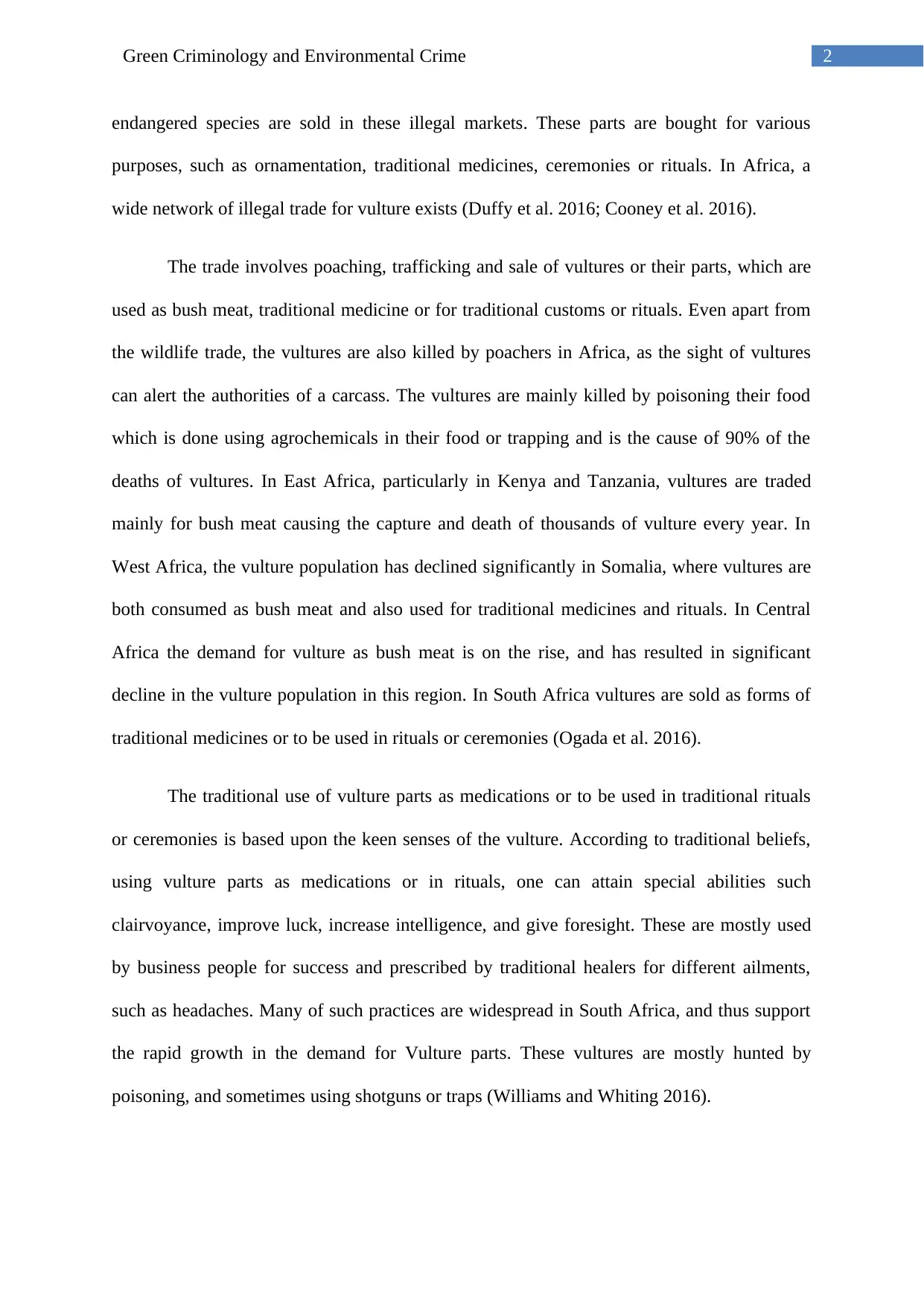
2Green Criminology and Environmental Crime
endangered species are sold in these illegal markets. These parts are bought for various
purposes, such as ornamentation, traditional medicines, ceremonies or rituals. In Africa, a
wide network of illegal trade for vulture exists (Duffy et al. 2016; Cooney et al. 2016).
The trade involves poaching, trafficking and sale of vultures or their parts, which are
used as bush meat, traditional medicine or for traditional customs or rituals. Even apart from
the wildlife trade, the vultures are also killed by poachers in Africa, as the sight of vultures
can alert the authorities of a carcass. The vultures are mainly killed by poisoning their food
which is done using agrochemicals in their food or trapping and is the cause of 90% of the
deaths of vultures. In East Africa, particularly in Kenya and Tanzania, vultures are traded
mainly for bush meat causing the capture and death of thousands of vulture every year. In
West Africa, the vulture population has declined significantly in Somalia, where vultures are
both consumed as bush meat and also used for traditional medicines and rituals. In Central
Africa the demand for vulture as bush meat is on the rise, and has resulted in significant
decline in the vulture population in this region. In South Africa vultures are sold as forms of
traditional medicines or to be used in rituals or ceremonies (Ogada et al. 2016).
The traditional use of vulture parts as medications or to be used in traditional rituals
or ceremonies is based upon the keen senses of the vulture. According to traditional beliefs,
using vulture parts as medications or in rituals, one can attain special abilities such
clairvoyance, improve luck, increase intelligence, and give foresight. These are mostly used
by business people for success and prescribed by traditional healers for different ailments,
such as headaches. Many of such practices are widespread in South Africa, and thus support
the rapid growth in the demand for Vulture parts. These vultures are mostly hunted by
poisoning, and sometimes using shotguns or traps (Williams and Whiting 2016).
endangered species are sold in these illegal markets. These parts are bought for various
purposes, such as ornamentation, traditional medicines, ceremonies or rituals. In Africa, a
wide network of illegal trade for vulture exists (Duffy et al. 2016; Cooney et al. 2016).
The trade involves poaching, trafficking and sale of vultures or their parts, which are
used as bush meat, traditional medicine or for traditional customs or rituals. Even apart from
the wildlife trade, the vultures are also killed by poachers in Africa, as the sight of vultures
can alert the authorities of a carcass. The vultures are mainly killed by poisoning their food
which is done using agrochemicals in their food or trapping and is the cause of 90% of the
deaths of vultures. In East Africa, particularly in Kenya and Tanzania, vultures are traded
mainly for bush meat causing the capture and death of thousands of vulture every year. In
West Africa, the vulture population has declined significantly in Somalia, where vultures are
both consumed as bush meat and also used for traditional medicines and rituals. In Central
Africa the demand for vulture as bush meat is on the rise, and has resulted in significant
decline in the vulture population in this region. In South Africa vultures are sold as forms of
traditional medicines or to be used in rituals or ceremonies (Ogada et al. 2016).
The traditional use of vulture parts as medications or to be used in traditional rituals
or ceremonies is based upon the keen senses of the vulture. According to traditional beliefs,
using vulture parts as medications or in rituals, one can attain special abilities such
clairvoyance, improve luck, increase intelligence, and give foresight. These are mostly used
by business people for success and prescribed by traditional healers for different ailments,
such as headaches. Many of such practices are widespread in South Africa, and thus support
the rapid growth in the demand for Vulture parts. These vultures are mostly hunted by
poisoning, and sometimes using shotguns or traps (Williams and Whiting 2016).
⊘ This is a preview!⊘
Do you want full access?
Subscribe today to unlock all pages.

Trusted by 1+ million students worldwide
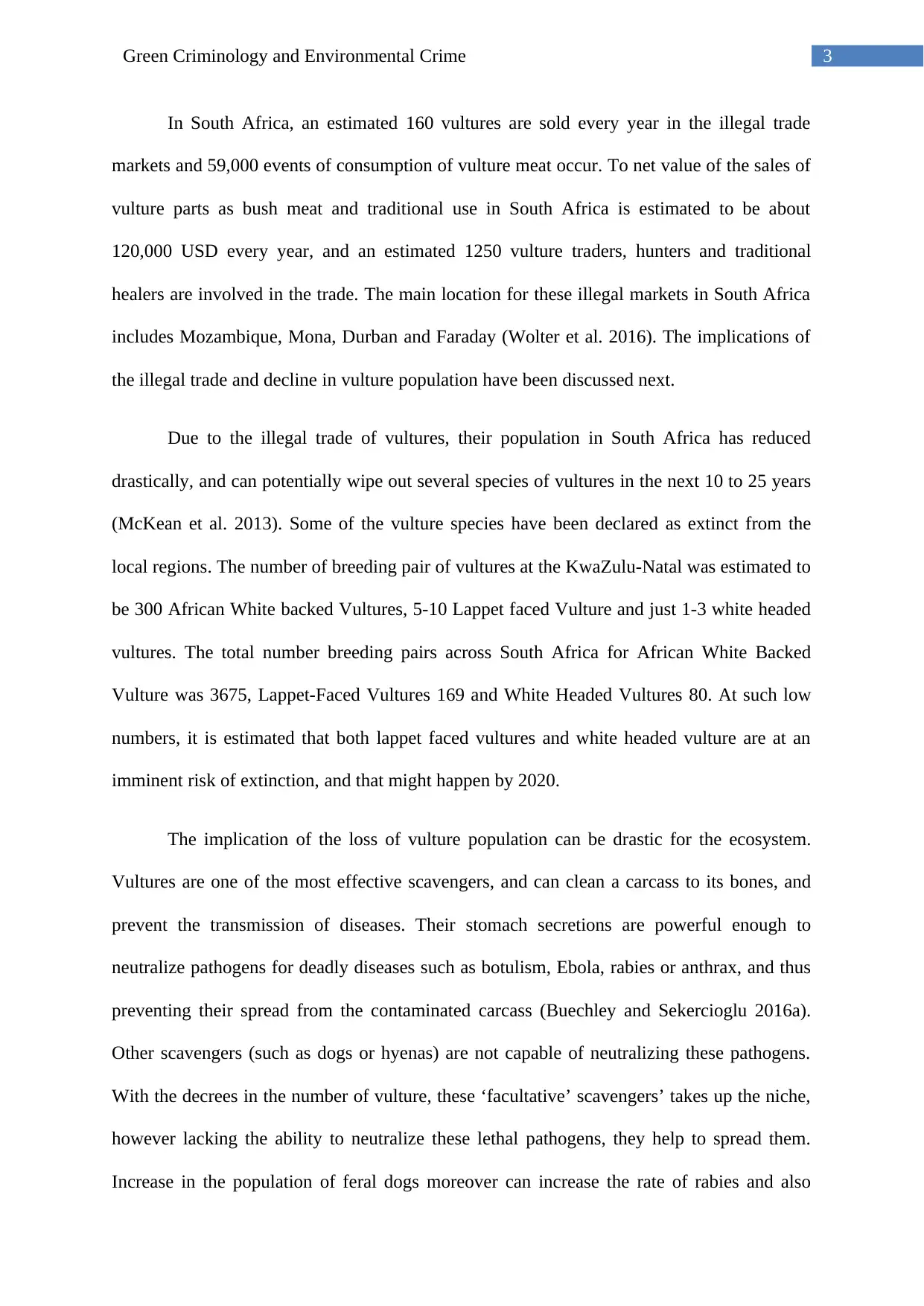
3Green Criminology and Environmental Crime
In South Africa, an estimated 160 vultures are sold every year in the illegal trade
markets and 59,000 events of consumption of vulture meat occur. To net value of the sales of
vulture parts as bush meat and traditional use in South Africa is estimated to be about
120,000 USD every year, and an estimated 1250 vulture traders, hunters and traditional
healers are involved in the trade. The main location for these illegal markets in South Africa
includes Mozambique, Mona, Durban and Faraday (Wolter et al. 2016). The implications of
the illegal trade and decline in vulture population have been discussed next.
Due to the illegal trade of vultures, their population in South Africa has reduced
drastically, and can potentially wipe out several species of vultures in the next 10 to 25 years
(McKean et al. 2013). Some of the vulture species have been declared as extinct from the
local regions. The number of breeding pair of vultures at the KwaZulu-Natal was estimated to
be 300 African White backed Vultures, 5-10 Lappet faced Vulture and just 1-3 white headed
vultures. The total number breeding pairs across South Africa for African White Backed
Vulture was 3675, Lappet-Faced Vultures 169 and White Headed Vultures 80. At such low
numbers, it is estimated that both lappet faced vultures and white headed vulture are at an
imminent risk of extinction, and that might happen by 2020.
The implication of the loss of vulture population can be drastic for the ecosystem.
Vultures are one of the most effective scavengers, and can clean a carcass to its bones, and
prevent the transmission of diseases. Their stomach secretions are powerful enough to
neutralize pathogens for deadly diseases such as botulism, Ebola, rabies or anthrax, and thus
preventing their spread from the contaminated carcass (Buechley and Sekercioglu 2016a).
Other scavengers (such as dogs or hyenas) are not capable of neutralizing these pathogens.
With the decrees in the number of vulture, these ‘facultative’ scavengers’ takes up the niche,
however lacking the ability to neutralize these lethal pathogens, they help to spread them.
Increase in the population of feral dogs moreover can increase the rate of rabies and also
In South Africa, an estimated 160 vultures are sold every year in the illegal trade
markets and 59,000 events of consumption of vulture meat occur. To net value of the sales of
vulture parts as bush meat and traditional use in South Africa is estimated to be about
120,000 USD every year, and an estimated 1250 vulture traders, hunters and traditional
healers are involved in the trade. The main location for these illegal markets in South Africa
includes Mozambique, Mona, Durban and Faraday (Wolter et al. 2016). The implications of
the illegal trade and decline in vulture population have been discussed next.
Due to the illegal trade of vultures, their population in South Africa has reduced
drastically, and can potentially wipe out several species of vultures in the next 10 to 25 years
(McKean et al. 2013). Some of the vulture species have been declared as extinct from the
local regions. The number of breeding pair of vultures at the KwaZulu-Natal was estimated to
be 300 African White backed Vultures, 5-10 Lappet faced Vulture and just 1-3 white headed
vultures. The total number breeding pairs across South Africa for African White Backed
Vulture was 3675, Lappet-Faced Vultures 169 and White Headed Vultures 80. At such low
numbers, it is estimated that both lappet faced vultures and white headed vulture are at an
imminent risk of extinction, and that might happen by 2020.
The implication of the loss of vulture population can be drastic for the ecosystem.
Vultures are one of the most effective scavengers, and can clean a carcass to its bones, and
prevent the transmission of diseases. Their stomach secretions are powerful enough to
neutralize pathogens for deadly diseases such as botulism, Ebola, rabies or anthrax, and thus
preventing their spread from the contaminated carcass (Buechley and Sekercioglu 2016a).
Other scavengers (such as dogs or hyenas) are not capable of neutralizing these pathogens.
With the decrees in the number of vulture, these ‘facultative’ scavengers’ takes up the niche,
however lacking the ability to neutralize these lethal pathogens, they help to spread them.
Increase in the population of feral dogs moreover can increase the rate of rabies and also
Paraphrase This Document
Need a fresh take? Get an instant paraphrase of this document with our AI Paraphraser
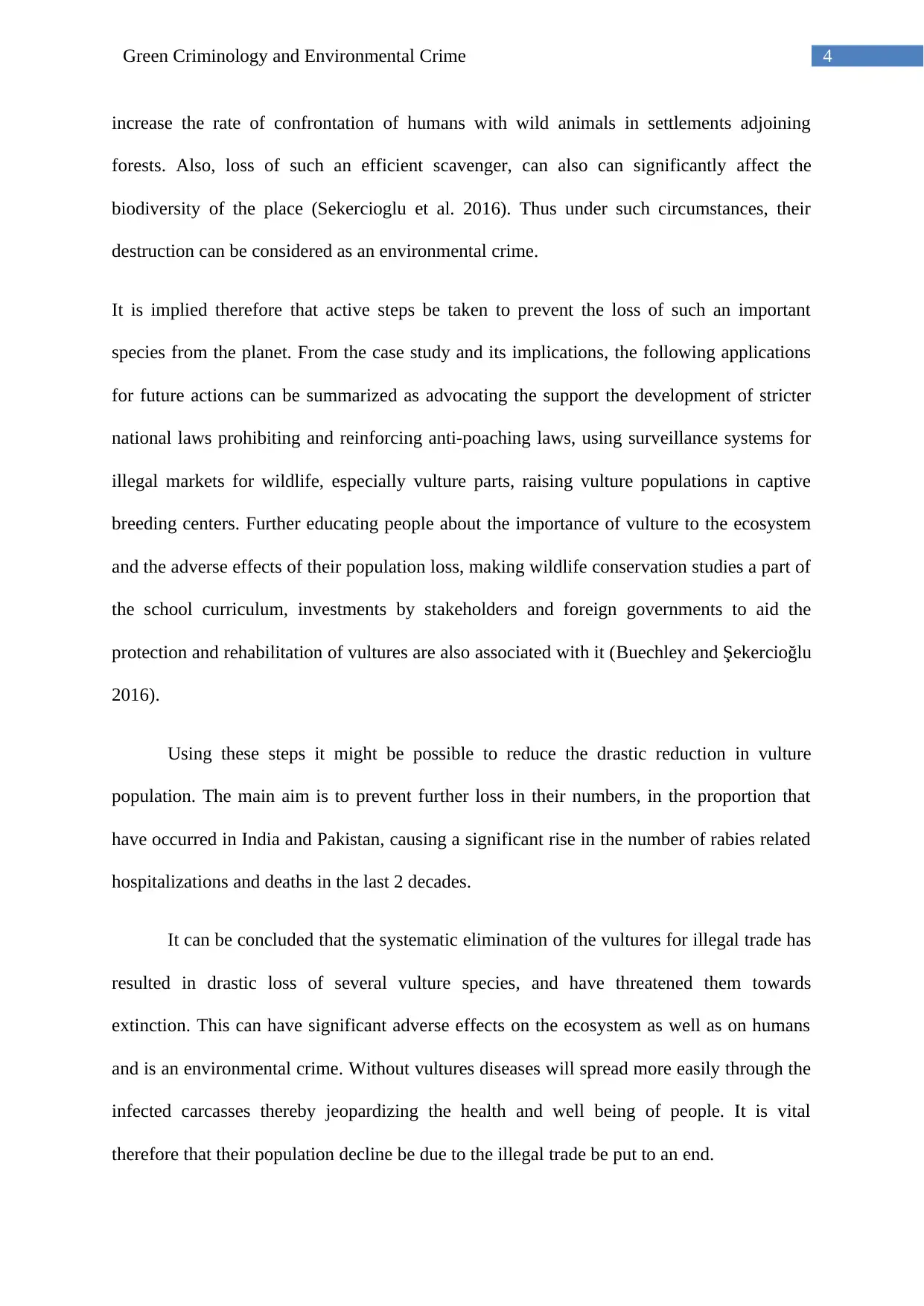
4Green Criminology and Environmental Crime
increase the rate of confrontation of humans with wild animals in settlements adjoining
forests. Also, loss of such an efficient scavenger, can also can significantly affect the
biodiversity of the place (Sekercioglu et al. 2016). Thus under such circumstances, their
destruction can be considered as an environmental crime.
It is implied therefore that active steps be taken to prevent the loss of such an important
species from the planet. From the case study and its implications, the following applications
for future actions can be summarized as advocating the support the development of stricter
national laws prohibiting and reinforcing anti-poaching laws, using surveillance systems for
illegal markets for wildlife, especially vulture parts, raising vulture populations in captive
breeding centers. Further educating people about the importance of vulture to the ecosystem
and the adverse effects of their population loss, making wildlife conservation studies a part of
the school curriculum, investments by stakeholders and foreign governments to aid the
protection and rehabilitation of vultures are also associated with it (Buechley and Şekercioğlu
2016).
Using these steps it might be possible to reduce the drastic reduction in vulture
population. The main aim is to prevent further loss in their numbers, in the proportion that
have occurred in India and Pakistan, causing a significant rise in the number of rabies related
hospitalizations and deaths in the last 2 decades.
It can be concluded that the systematic elimination of the vultures for illegal trade has
resulted in drastic loss of several vulture species, and have threatened them towards
extinction. This can have significant adverse effects on the ecosystem as well as on humans
and is an environmental crime. Without vultures diseases will spread more easily through the
infected carcasses thereby jeopardizing the health and well being of people. It is vital
therefore that their population decline be due to the illegal trade be put to an end.
increase the rate of confrontation of humans with wild animals in settlements adjoining
forests. Also, loss of such an efficient scavenger, can also can significantly affect the
biodiversity of the place (Sekercioglu et al. 2016). Thus under such circumstances, their
destruction can be considered as an environmental crime.
It is implied therefore that active steps be taken to prevent the loss of such an important
species from the planet. From the case study and its implications, the following applications
for future actions can be summarized as advocating the support the development of stricter
national laws prohibiting and reinforcing anti-poaching laws, using surveillance systems for
illegal markets for wildlife, especially vulture parts, raising vulture populations in captive
breeding centers. Further educating people about the importance of vulture to the ecosystem
and the adverse effects of their population loss, making wildlife conservation studies a part of
the school curriculum, investments by stakeholders and foreign governments to aid the
protection and rehabilitation of vultures are also associated with it (Buechley and Şekercioğlu
2016).
Using these steps it might be possible to reduce the drastic reduction in vulture
population. The main aim is to prevent further loss in their numbers, in the proportion that
have occurred in India and Pakistan, causing a significant rise in the number of rabies related
hospitalizations and deaths in the last 2 decades.
It can be concluded that the systematic elimination of the vultures for illegal trade has
resulted in drastic loss of several vulture species, and have threatened them towards
extinction. This can have significant adverse effects on the ecosystem as well as on humans
and is an environmental crime. Without vultures diseases will spread more easily through the
infected carcasses thereby jeopardizing the health and well being of people. It is vital
therefore that their population decline be due to the illegal trade be put to an end.
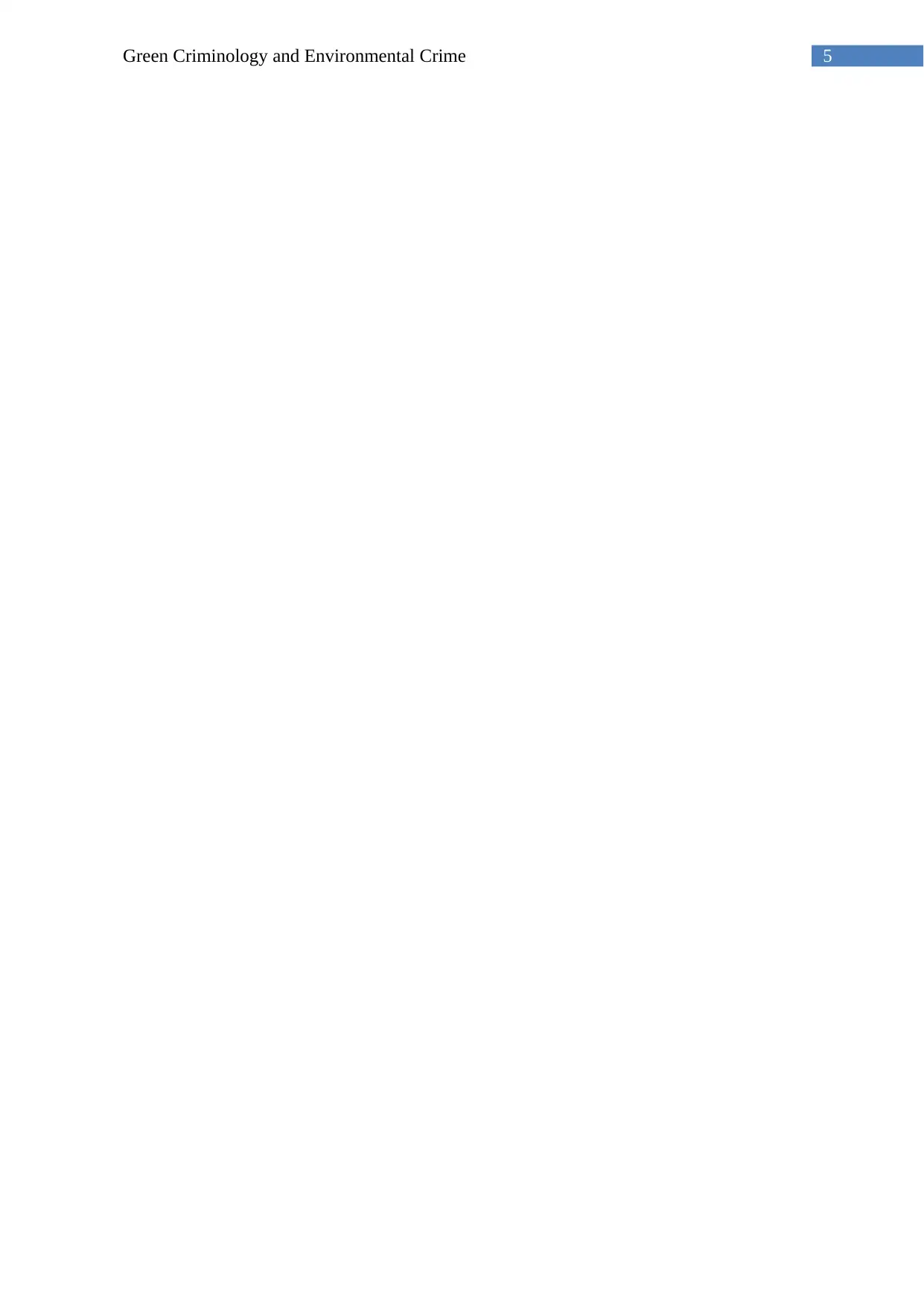
5Green Criminology and Environmental Crime
⊘ This is a preview!⊘
Do you want full access?
Subscribe today to unlock all pages.

Trusted by 1+ million students worldwide
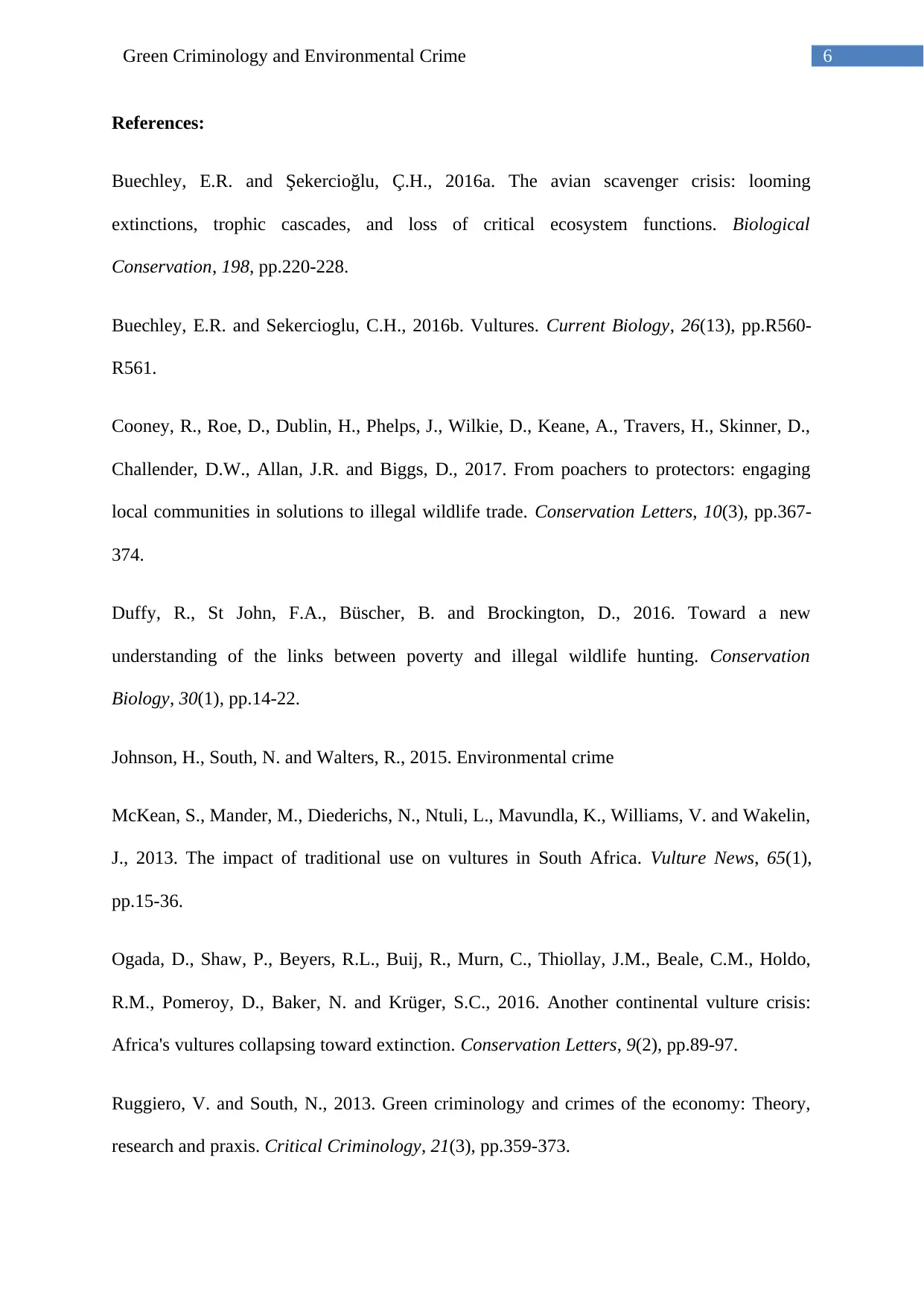
6Green Criminology and Environmental Crime
References:
Buechley, E.R. and Şekercioğlu, Ç.H., 2016a. The avian scavenger crisis: looming
extinctions, trophic cascades, and loss of critical ecosystem functions. Biological
Conservation, 198, pp.220-228.
Buechley, E.R. and Sekercioglu, C.H., 2016b. Vultures. Current Biology, 26(13), pp.R560-
R561.
Cooney, R., Roe, D., Dublin, H., Phelps, J., Wilkie, D., Keane, A., Travers, H., Skinner, D.,
Challender, D.W., Allan, J.R. and Biggs, D., 2017. From poachers to protectors: engaging
local communities in solutions to illegal wildlife trade. Conservation Letters, 10(3), pp.367-
374.
Duffy, R., St John, F.A., Büscher, B. and Brockington, D., 2016. Toward a new
understanding of the links between poverty and illegal wildlife hunting. Conservation
Biology, 30(1), pp.14-22.
Johnson, H., South, N. and Walters, R., 2015. Environmental crime
McKean, S., Mander, M., Diederichs, N., Ntuli, L., Mavundla, K., Williams, V. and Wakelin,
J., 2013. The impact of traditional use on vultures in South Africa. Vulture News, 65(1),
pp.15-36.
Ogada, D., Shaw, P., Beyers, R.L., Buij, R., Murn, C., Thiollay, J.M., Beale, C.M., Holdo,
R.M., Pomeroy, D., Baker, N. and Krüger, S.C., 2016. Another continental vulture crisis:
Africa's vultures collapsing toward extinction. Conservation Letters, 9(2), pp.89-97.
Ruggiero, V. and South, N., 2013. Green criminology and crimes of the economy: Theory,
research and praxis. Critical Criminology, 21(3), pp.359-373.
References:
Buechley, E.R. and Şekercioğlu, Ç.H., 2016a. The avian scavenger crisis: looming
extinctions, trophic cascades, and loss of critical ecosystem functions. Biological
Conservation, 198, pp.220-228.
Buechley, E.R. and Sekercioglu, C.H., 2016b. Vultures. Current Biology, 26(13), pp.R560-
R561.
Cooney, R., Roe, D., Dublin, H., Phelps, J., Wilkie, D., Keane, A., Travers, H., Skinner, D.,
Challender, D.W., Allan, J.R. and Biggs, D., 2017. From poachers to protectors: engaging
local communities in solutions to illegal wildlife trade. Conservation Letters, 10(3), pp.367-
374.
Duffy, R., St John, F.A., Büscher, B. and Brockington, D., 2016. Toward a new
understanding of the links between poverty and illegal wildlife hunting. Conservation
Biology, 30(1), pp.14-22.
Johnson, H., South, N. and Walters, R., 2015. Environmental crime
McKean, S., Mander, M., Diederichs, N., Ntuli, L., Mavundla, K., Williams, V. and Wakelin,
J., 2013. The impact of traditional use on vultures in South Africa. Vulture News, 65(1),
pp.15-36.
Ogada, D., Shaw, P., Beyers, R.L., Buij, R., Murn, C., Thiollay, J.M., Beale, C.M., Holdo,
R.M., Pomeroy, D., Baker, N. and Krüger, S.C., 2016. Another continental vulture crisis:
Africa's vultures collapsing toward extinction. Conservation Letters, 9(2), pp.89-97.
Ruggiero, V. and South, N., 2013. Green criminology and crimes of the economy: Theory,
research and praxis. Critical Criminology, 21(3), pp.359-373.
Paraphrase This Document
Need a fresh take? Get an instant paraphrase of this document with our AI Paraphraser
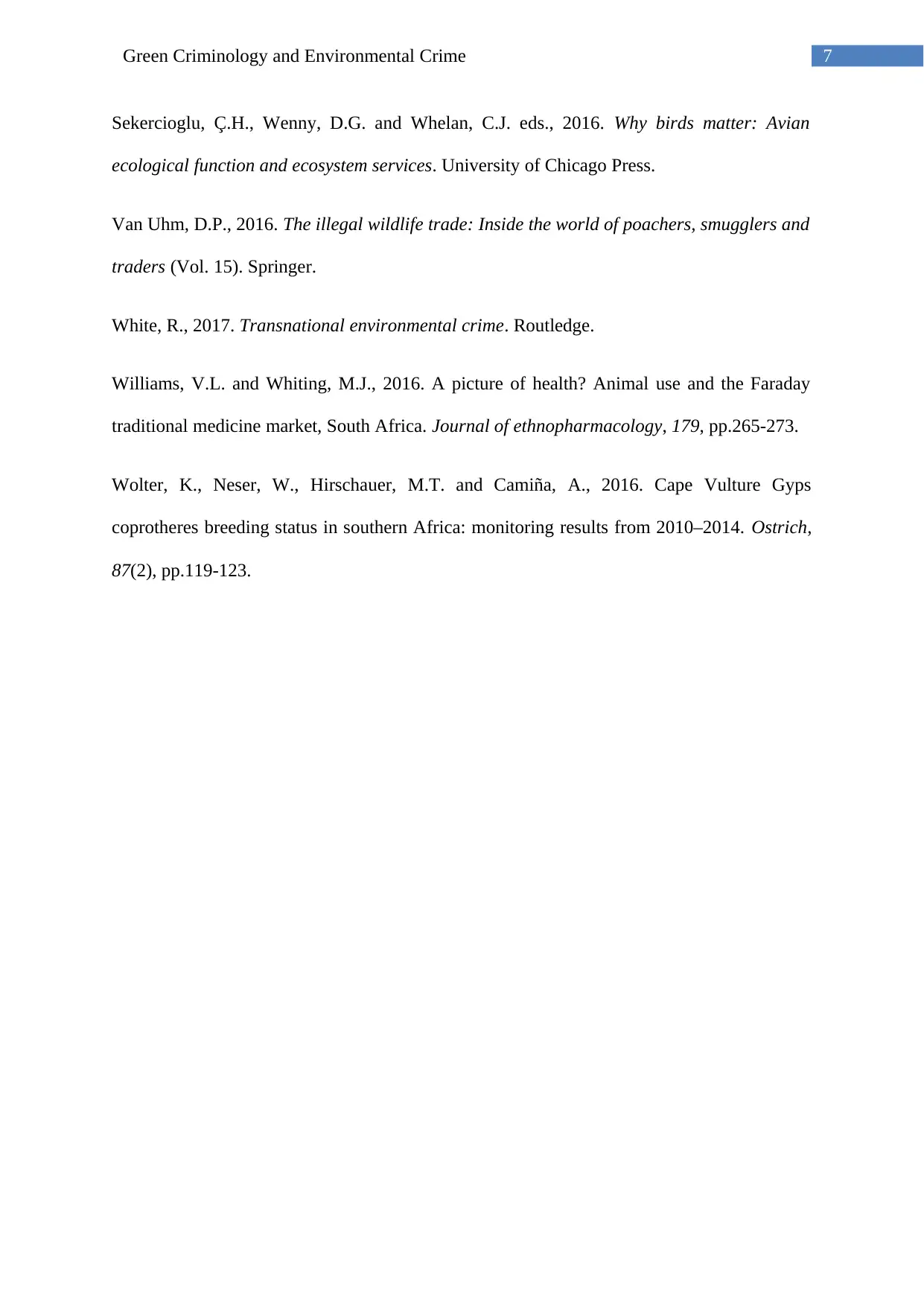
7Green Criminology and Environmental Crime
Sekercioglu, Ç.H., Wenny, D.G. and Whelan, C.J. eds., 2016. Why birds matter: Avian
ecological function and ecosystem services. University of Chicago Press.
Van Uhm, D.P., 2016. The illegal wildlife trade: Inside the world of poachers, smugglers and
traders (Vol. 15). Springer.
White, R., 2017. Transnational environmental crime. Routledge.
Williams, V.L. and Whiting, M.J., 2016. A picture of health? Animal use and the Faraday
traditional medicine market, South Africa. Journal of ethnopharmacology, 179, pp.265-273.
Wolter, K., Neser, W., Hirschauer, M.T. and Camiña, A., 2016. Cape Vulture Gyps
coprotheres breeding status in southern Africa: monitoring results from 2010–2014. Ostrich,
87(2), pp.119-123.
Sekercioglu, Ç.H., Wenny, D.G. and Whelan, C.J. eds., 2016. Why birds matter: Avian
ecological function and ecosystem services. University of Chicago Press.
Van Uhm, D.P., 2016. The illegal wildlife trade: Inside the world of poachers, smugglers and
traders (Vol. 15). Springer.
White, R., 2017. Transnational environmental crime. Routledge.
Williams, V.L. and Whiting, M.J., 2016. A picture of health? Animal use and the Faraday
traditional medicine market, South Africa. Journal of ethnopharmacology, 179, pp.265-273.
Wolter, K., Neser, W., Hirschauer, M.T. and Camiña, A., 2016. Cape Vulture Gyps
coprotheres breeding status in southern Africa: monitoring results from 2010–2014. Ostrich,
87(2), pp.119-123.
1 out of 8
Your All-in-One AI-Powered Toolkit for Academic Success.
+13062052269
info@desklib.com
Available 24*7 on WhatsApp / Email
![[object Object]](/_next/static/media/star-bottom.7253800d.svg)
Unlock your academic potential
Copyright © 2020–2026 A2Z Services. All Rights Reserved. Developed and managed by ZUCOL.